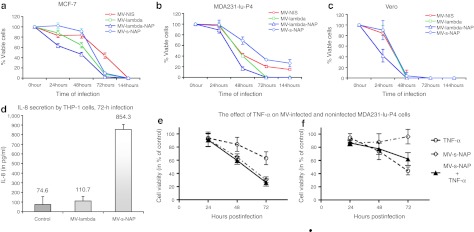Figure 2.
In vitro antitumor activity of engineered measles virus (MV) strains against breast cancer cells. (a) MCF-7 cell line and the highly tumorigenic MDA231-lu-P4 in vivo derivative of (b) MDA-MB-231 cells were infected with MV strains at an multiplicity of infection (MOI) = 1.0 and cell viability was determined by MTT assay. Both MV-lambda-NAP and MV-lambda viruses propagated rapidly causing complete destruction of the breast cancer monolayers 72 hours postinfection. MV-s-NAP and MV-NIS showed similar tumor cell-killing kinetics with complete eradication of MCF-7 cells or ~80% reduction of cell viability of MDA231-lu-P4 cells. (c) Vero cells were used as control. The data are presented as percent of untreated control cells ± SD. (d) NAP transgene induced significant interleukin (IL)-8 expression in MV vector-infected THP-1 cells. THP-1 monocytic cells were infected with MV-s-NAP or control MV-lambda virus at a MOI = 0.1 and incubated for 72 hours. Supernatants were collected and IL-8 concentration was measured by enzyme-linked immunosorbent assay (ELISA) specific for human IL-8. The effect of TNF-α (one of the known NAP-triggered inflammatory cytokines) on proliferation of MV-infected or uninfected MDA231-lu-P4 cells was examined by MTT assay (e,f). MDA231-lu-P4 cells were plated at 104 cell/well density and inoculated at MOI = 0.5 of MV-s-NAP in the presence or absence of 250 U/ml recombinant human TNF-α (e). The same experiment was repeated with lower cell density (2.5 × 103 per well) and MV-s-NAP at MOI of 0.25 (f).

